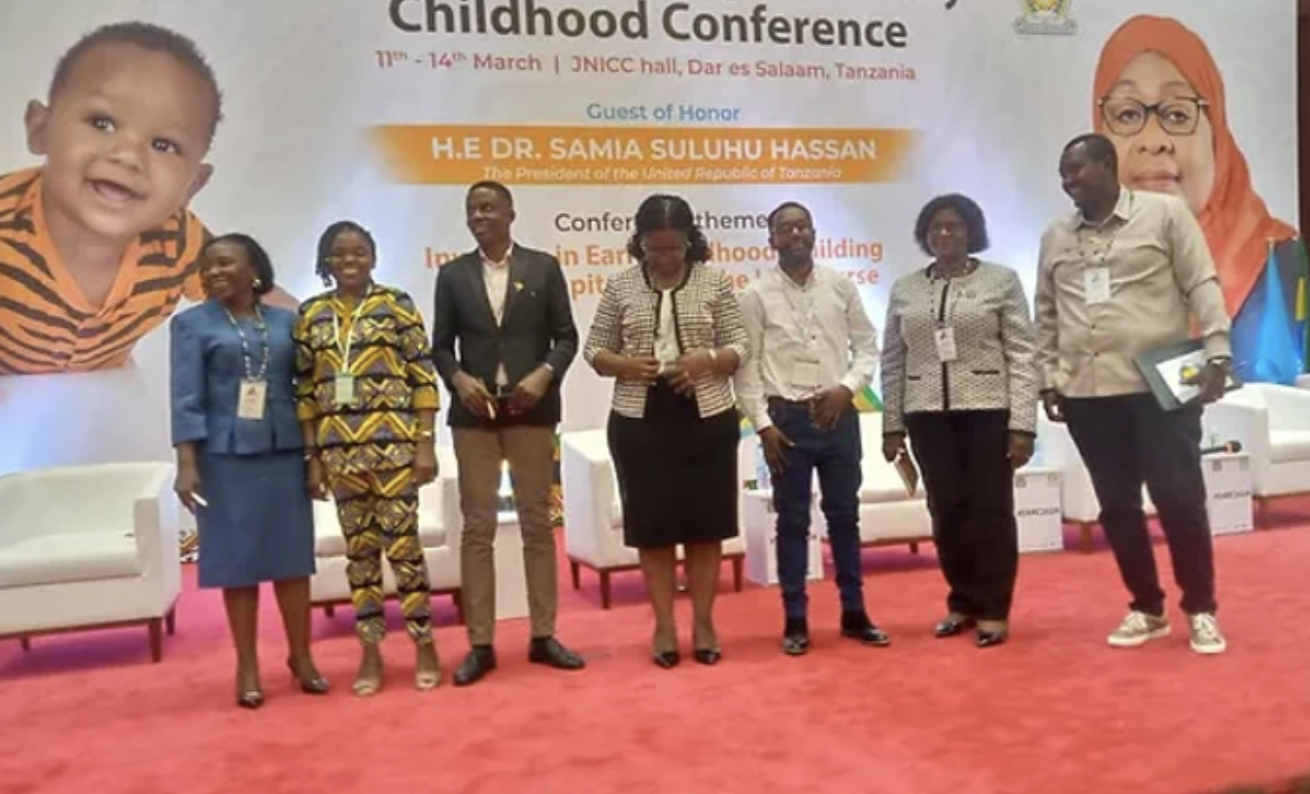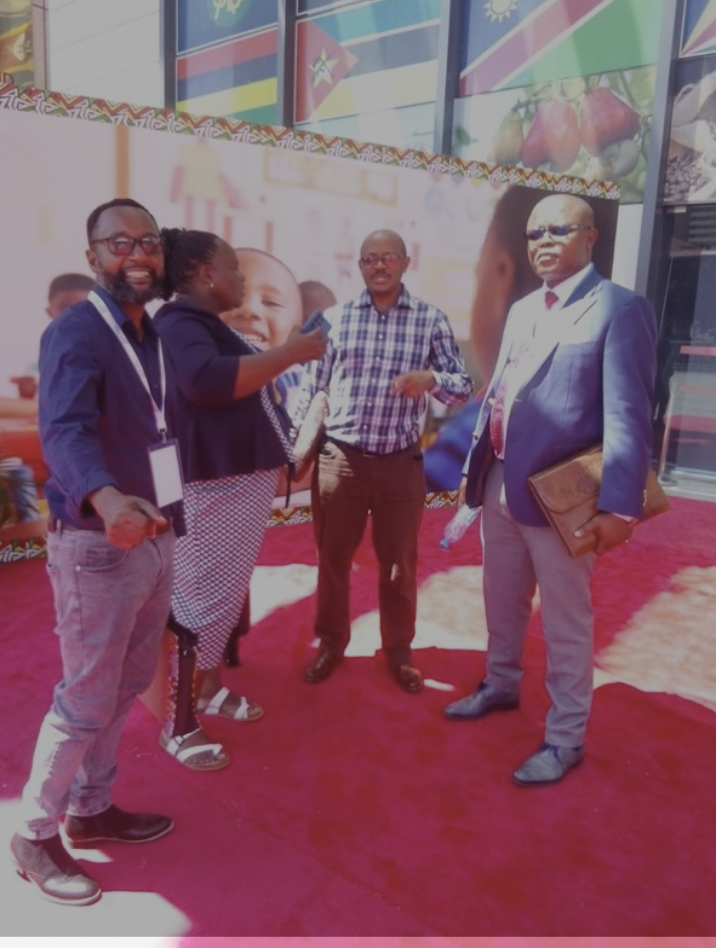Taking the Model of Supporting Early Childhood through Ubuntu to a Wider Audience
This is the sixth of our ten-part blog series by African Early Childhood Development (ECD) researchers. Written by Meinrad Lembuka, Assistant Lecturer, The Open University of Tanzania.

Post Session Conference Presenters in the Group Photo
Through this blog, I reflect on my experience of participating and presenting an academic paper at the Eastern Africa Regional Early Childhood Conference (EARECC) that took place in March 2024 in Dar es Salaam, Tanzania. This sponsorship opportunity exposed me to new networks and collaborations with other researchers, academics and other key stakeholders in Early Childhood Development (ECD).
ESSA and the REAL Centre also sponsored other ECD researchers from other parts Africa to attend and present in the conference, which linked and united a diverse group of researchers, practitioners, and policymakers from across Africa and beyond. The conference also offered a platform to explore themes related to ECD, fostering a shared understanding and collaborative approach to the challenges and opportunities ahead.
As we all know, symposia are a great opportunity to showcase our expertise, network with other professionals, and learn about the latest trends in the field. Conferences like EARECC 2024 serve as a source of inspiration and motivation for both presenters and attendees. Apart from presenting, there was so much to learn, hear success stories and findings from cutting-edge research that ignited new ideas and fuelled a passion for research ideas. The energy and enthusiasm generated at the conference had a transformative impact on my professional journey. It was an interactive conference with various seminars and workshops that rendered an opportunity to engage with fellow professionals and receive their valuable insights that greatly enhanced the research and exchange of ideas.
My oral presentation was titled, ‘Ubuntu as a Collective Community Empowering Tool on Effective Early Childhood in Tanzania – A Case of Mama Mkubwa Model.’ This was based on a systematic literature review that highlighted the challenges and opportunities of indigenisation models in ECD taking a practical example of the Mama Mkubwa Model (MMM). Presenting at this conference was a great opportunity for gaining valuable feedback from a community of scholars and for increasing the professional stature in the ECD field.
The paper focused on ‘Ubuntu’ which offers a new insight on ECD and highlighted the already-existing Ubuntu models in the African context from pre-colonial time. MMM, like other ECD Ubuntu-related models, are guided by an African philosophy that represents the model of humanism guided by the values of human dignity, solidarity, care, compassion, harmony, equality, etc. These values have been an integral part of African ECD but challenged by colonial legacy – yet they continue to hold a strong influence in post-colonial Africa.
MMM is an indigenous and ecological community-based model that was practiced in Tanzania from the pre-colonial era that represents other indigenous models of childcare and development in African ecological perspective known as ‘Ubuntu’. The research used a desk review method to assess the implications of MMM, whereby Mama Mkubwa in Swahili translates to ‘mother’s elder sister’ or ‘trusted elder woman.’ In the community, this woman is voted to take care of the vulnerable on behalf of the family and community.
Mama Mkubwa is a person with good integrity, compassion, maturity, tenderness and passion for children, and is selected among the extended family members or community to care for a child on voluntary bases. Evidence shows that MMM represents a variety of African Ubuntu models for child development in the African context, that have been developed to ensure the realisation of effective child development through integrating local community, cultural values and ecology in addressing the special needs of orphans and vulnerable children. ‘Ubuntu’ translates to African humanism or humanness, where all individuals in the community are collectively responsible for community development, especially for vulnerable populations including children.
Despite the community strength in Ubuntu, each individual in the community is responsible for contributing to the welfare of the child under the guidance of African Ubuntu values.
The model is holistic and collective in nature that functions across various ecological intersections in society, including individuals, family, extended family members, groups, clans, local leaders, customary laws and community at large. MMM takes good care of a child on behalf of the parents but the whole community has a close follow up and support for the child’s development (socially, psychologically and spiritually). In the 2000s, MMM became very strong in the Rufiji Coastal Region, Makete, Njombe, Kagera and Temeke, Dar es Salaam following the influx of orphans and vulnerable children, a result from the AIDS pandemic. MMM puts a greater emphasis on strengthening community-based action under the values of communality, cooperation, voluntary, interdependence, and ecology. Moreover, MMM gives opportunity to be integrated with formal child care systems through creating supportive environment and reduces child abuse.
Lastly, this conference enhanced my professional reputation and credibility in ECD.
Thanks to the sponsorship, my attendance at this event has allowed me to stay updated on the latest trends, innovations, and developments in ECD – levelling up my competence and credibility.
The vision of ESSA and the REAL Centre on the next steps for achieving a vibrant, high-impact and sustainable education research community in ECD is truly promising. This is a new paradigm shift to promote research originating from the Global South. I can envision the future of sub-Saharan educators and researchers in undertaking a comprehensive and inclusive design process that will ensure that African education research stakeholders will be actively involved and engaged in all steps of the process.
This will be a design process that openly invites African education research stakeholders to be ambitious in determining what could be done to help to realise the vision and mission of the relevant and sustainable education research in/by/for Africa.
ESSA and the Research for Equitable Access and Learning (REAL) Centre, University of Cambridge, are currently working in partnership on an Early Childhood Development (ECD) project with funding from the Conrad N. Hilton Foundation. The project focuses on understanding the ecosystem of ECD researchers and their needs in Ghana, Kenya, Tanzania, and Uganda (with desk-based research for Mozambique).
As part of this project, we sponsored ten ECD researchers to attend the Eastern Africa Regional Early Childhood Conference (EARECC) in Tanzania in March 2024 to give them the opportunity to share their work, network and explore research collaborations.
